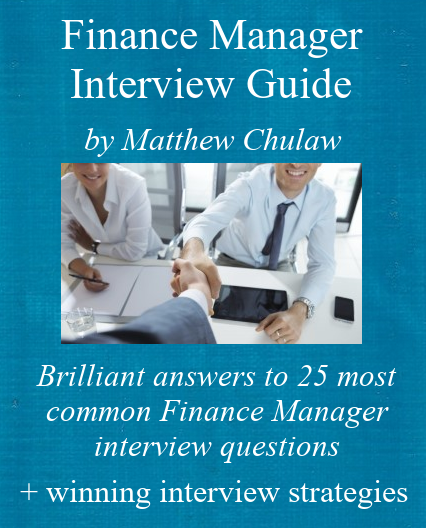Dear Manager,
I will keep this page short and to the point. Here’s what I have for you today:
In the eBook, you will find multiple great answers to each of the following questions:
- Why do you want to work as a Finance Manager?
- Why did you leave your last job?/Why do you plan to leave your present job?
- What do you expect from your subordinates, and from your superiors?
- What goals will you set for yourself if we hire you for this job, if we hire you?
- How would you ensure to get your message over to people who do not understand financial terminology?
- What are the most common challenges we face in FP&A now?
- How do you ensure that the company meets all compliance obligations?
- Tell us about a time when you demonstrated leadership at work.
- Tell me about a time when you had to make a decision without all the information you needed.
- Have you ever worked on a project that was a failure?
- … and 15 other tough questions you may face in your interview for a job of a Finance Manager, including tricky scenario-based questions.
Check the sample to see how this eBook can help you:
Sample from the eBook
Q: What do you expect from your subordinates, and from your superiors, as a Finance Manager?
Hint: You have several options for a good answer. First one is saying that you have high expectations on one person only—on yourself. The hiring managers have for sure done their job well, getting the right people onboard. It is not your duty to judge the qualification or motivation of your colleagues.
You will focus on your job and duties, giving your 100% at work each day, and trying to be attentive to the needs and feelings of your colleagues, in order to maintain good relationships in the workplace. This applies especially to your superiors.
Speaking about your subordinates, you will try to guide them in work, and you expect them to take care of their duties, and to try hard—following your example.
Another option is referring to communication. You can say that you hope to get constructive feedback from both your superiors and subordinates. And they should be receptive to such feedback from your end.
As long as people communicate openly together across the organization, regardless of their position within the corporate hierarchy, and everyone tries their best, the financial department and the entire organization will thrive.
One way or another, you can always emphasize that you want to go by an example, and won’t expect from your colleagues something you aren’t willing to do yourself…
Sample answers
– To be honest, a better question would be what they expect from me. I will be a new force in the company. You already have processes and roles in place in your FP&A, and I am eager to learn more about them. I want to try my 100% in the job, and also I want to be attentive to the needs and feelings of my new colleagues, and hopefully build good relationship with them. Maybe the only thing I expect from both groups—superiors and subordinates, is to give me a chance to prove my competence with my work, and to become a valuable member of the team.
– In my opinion, feedback should flow freely in all directions in a successful organization. And that is exactly what I expect from both my superiors and subordinates—to provide feedback on my work, to share constructive criticism, to explain the expectations, to talk about problems. I am definitely receptive to constructive criticism, and I also expect the same from the people I work with. Other than that, I do not have any special expectations.
Q: Have you ever worked on a project that was a failure?
Hint: Life is full of ups and down, successes and failures. The role-coaster ride goes on for most of us, basically since the day we are born until the day we die. In some periods of life successes may prevail and we may feel like standing on the top of the world. But sooner or later a huge setback arrives, teaching us a lesson of humility and acceptance.
Recruiters and hiring managers know that we learn the most important lessons when things do not go as planed. It’s then that we have to use our creativity and try to change things, or learn our lesson and quit, starting from scratch on another project, pursuing some other dream, or even choose a new walk of life.
That’s why questions about failures make a perfect sense in almost any corporate interview, and financial management is no exception.
Try to show the interviewers that you take failures as they come, accept them, learn from them, and move on. Do not blame others for the bad results. Accept responsibility. They expect such an attitude from the very best job candidates.
Sample answers
– I remember one demand forecast that went completely wrong. My employer paid the price, losing money in the process. But it was my mistake. What happened is that I underestimated certain market indicators, and was too optimistic in my analysis, predicting much greater demand for a certain product range in the summer months. The company bought stock and proceeded accordingly, but my forecasts turned out wrong. At the end of summer we ended up with a lot of stock that we could not sell during autumn or winter. But I prefer not think about it much. It happened, I learned my lesson, and I would not repeat the same mistake again.
– Speaking honestly, I worked on many such projects in my life. I have always enjoyed venturing into the unknown, trying new things, innovating, experimenting. In my last job in sales management I actually designed some new sales strategies, trying to capture leads on social media, such as Facebook groups. But I didn’t understand the platform well. After all my planning, and implementation, I actually captured only a few leads, and they did not convert. However, I failed to reach my goal, but I learned something new and improved my skills with social media. I believe I will benefit from it in my professional career down the road.
– Successful people do not fail. They either succeed, or learn. This is my attitude to both work and life. Surely as a manager I failed to reach my targets a few times. If I always reached them, I would not be here interviewing for a job with you… But I did not consider it a failure. It would be a failure if I didn’t try hard enough, which has never been the case. I tried my best, and it didn’t work out. Is it a failure? I would not say so. It’s a learning experience, something inevitable in a life of any successful man.
End of the sample
These were just two questions. You will find 25 in the eBook, including difficult scenario-based questions. But that’s not all.
To ensure you will get the job, I included in the book six principles you need to understand in order to ace your interview for a job of a Finance Manager.
Without talking too much about them, let me show you another short sample from the eBook:
Sample no. 2
Principle no. two: Try to always refer to their industry, and their specific situation.
Finance manager working at a high school has a vastly different set of responsibilities than a finance manager working for a retail store.
Someone managing finances of a healthcare institution needs knowledge of compliance rules and laws that is mostly irrelevant for someone working in a a finance department of a small IT company.
What’s more, it is a huge difference to work in a big corporation or public institution, and in a small organization.
In a big corporation you are “just another pawn” in the big scheme of things, always taking care of a limited set of processes and tasks, and having your exact place in the corporate hierarchy (reporting to someone—finance director, or head of the department, or a controller—depending on the organization of their department, and someone else reports to you—for example a small team of analysts).
In a small organization, however, you are typically responsible for a variety of tasks, including basic financial analysis and reporting (something your subordinated would do in a big corporation), and the accountant can be your only “colleague” who understands the difference between cash flow and income…
Bearing this in mind, it is absolutely pivotal to adjust your answers to two things:
- The industry of your prospective employer (healthcare, IT, food, retail, banking, etc).
- The size of the organization, and scope of responsibility you will have in your new job.
Do a good research about the company, and try to find……………………………..
End of the sample

And that’s it. I do not want to waste your time with lengthy sales pages, or imaginary discounts and fake reviews, just like most people do on their websites, while trying to sell you something.
You have read the samples, you know what the eBook is about, and surely you can tell whether it will help you or not.
I sincerely believe it will. And you can read it easily in two to four hours, it’s 17,000 words. Only things that truly matter, no secondary content.
Plus, of course, like with everything else we sell here on InterviewPenguin.com, you have a risk free sixty days money back guarantee. If you don’t like this eBook for any reason, or no reason at all, just let me know (email me at matthew[at]interviewpenguin[dot]com) within 60 days, and we will give you a full refund.
Quick Summary
- Brilliant answers to twenty five difficult questions you may get in your interview for a job of a Finance Manager.
- Several sample answers to each question, so you can choose one that reflects your values and experience.
- Six principles of acing the interview, things you simply need to know in order to make the right impression on the hiring managers.
- Instant download, .PDF format (you can read it on any device (mobile, kindle, PC), and you can easily print it).
- Secure and simple checkout with PayPal, you can pay with your credit/debit card, or with your PayPal account.
- Price: $24.95, one time payment, no hidden fees or upsell. 60 days risk free money back guarantee . Sold exclusively on InterviewPenguin.com.
- Click the checkout button below to proceed to the payment.
(After the payment you will be directed back to our website, to a protected page, to download your eBook. You will also receive a download link and instructions to your email, just to ensure that you will get the book without waiting, even if the redirect fails.)
That’s it. Your interview for a job of a Finance Manager does not have to be stressful, or difficult. You can interview with confidence, and give brilliant answers to all tough questions. Download the guide today, and succeed in your interview.
Sincerely,
Matthew Chulaw,
Your personal job interview coach
P.S. Send me a message if you have any additional questions. I try my best to answer all emails within twelve hours (matthew[at]interviewpenguin[dot]com). Thank you!

